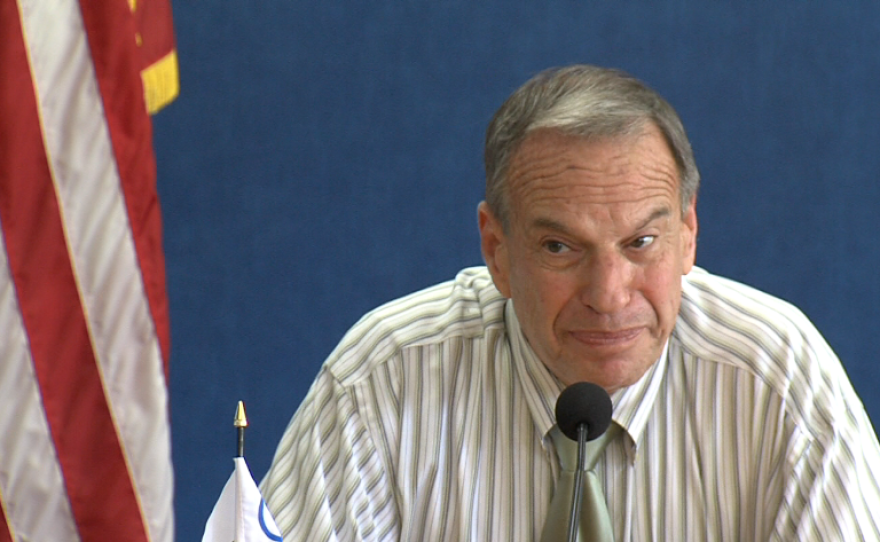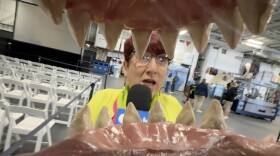CAVANAUGH: Our top story on Midday Edition, if mayor Bob Filner leaves before the end of his term following sexual harassment allegations, he certainly won't be the first San Diego mayor to resign. But if he's recalled, that will be a first for the city. These and other fun facts are popping up as we all wonder how this extraordinary San Diego scandal is going to end. We're asking what happened to the city when other mayors stepped down from office, for instance when Roger Hedgecock was forced to resign, or when Pete Wilson left to become a Senator. Joining me is a man who's researched San Diego politics and issues for years. Steve Erie is a UC San Diego professor of political science. Welcome to the show. ERIE: Good to be here, Maureen. CAVANAUGH: We've got a situation where people are looking a bit to the past to find out what San Diego has done when City Hall was shaken up by a mayor's resignation. During the 19th century, City Hall was still pretty much the wild west. Then there were two mayors that resigned in the early part of the 20th century. But for our purpose, we'll concentrate on the modern era of San Diego. So Steve, could you give us a rundown of which mayors in modern times have stepped down? ERIE: Well, you've got basically three. Pete Wilson when he was elected to the U.S. Senate in the early '80s, Roger Hedgecock, who was convicted for campaign money laundering, later overturned. But he resigned. And then of course Dick Murphy. Within days of him appearing on time magazine's cover as one of the three worst mayors in San Diego. But understand is that the rules of the game were different then. We didn't have the strong mayor system. We had the council manager system. And let's just sort of walk through how things were done. CAVANAUGH: Sure. ERIE: When are Pete resigned, and the council manager system, the mayor sits in the City Council, presides, controls the agenda, committee assignments, but you have a deputy mayor. And the deputy mayor fills in for the mayor when the mayor is incapacitated or out of town or when they resign. And with Pete Wilson, Bill Cleater stepped in as the acting mayor. And when Roger Hedgecock resigned, shortly before the conviction, are the felony conviction would stick, it was councilman Ed Struiksma. And under the old San Diego charter, whether you called a special election or kept the deputy mayor as the acting mayor depends upon how deep into the 4-year mayor's term the resignation occurred. If it occurred right within the last year, are then the acting mayor would be mayor until the next regularly scheduled municipal election. If it were earlier on, then you would schedule a special election. And that's exactly what happened with -- when Pete Wilson resigned. We had a couple of elections. Maureen O'Connor and Roger Hedgecock in 1983 and in 1984, for the unexpired and then the full term. So things were done fairly regularly under that system. And even when Dick Murphy stepped down, even though Murphy late in his career embraced the strong mayor system after earlier opposing it, the same thing worked. It's just that things got a little more complicated after judge Murphy left office. Because three of the City Council people were being tried under what we call strippergate, including Michael Zucchet who was briefly, for nanoseconds, the acting mayor before being convicted. That was overturned. And then afterwards, Tony Atkins stepped in as the acting mayor. So there were procedures in place to handle things. CAVANAUGH: Now, I'm going to stop you right there. We're getting a lot of static on your line. Maybe if you can readjust yourself a little bit there. And I also want to ask you, I'm so glad that you -- I think that's much better. ERIE: I'll lean forward. [ LAUGHTER ] CAVANAUGH: Okay! Now, I'm glad that you explained the difference between the council system and the strong mayor system because that makes a big difference. And I have a couple more questions on that for you in just a moment. But of the resignations that you just mentioned, Pete Wilson, Roger Hedgecock, Dick Murphy, which of them do you think was most traumatic for the city? ERIE: Well Pete's was expected. And he had had just a glorious run. He is the iconic modern mayor of San Diego. Certainly Dick Murphy, because we were mired right in the pension scandal at the time. There was also the 2003 wildfire. So things were -- that was a very, very tough time. And we wound up having two mayors, acting mayors, first Zuchett, and then Atkins. So I think that was pretty traumatic, and it was also semitraumatic in the early '80s with Hedgecock's resignation because here was a mayor who was actually convicted of a felony. Later overturned, but we -- that doesn't happen much in San Diego history. CAVANAUGH: We're having that static problem again. I wonder if you could -- ERIE: I'm doing everything I possibly can. [ LAUGHTER ] CAVANAUGH: That sounds wonderful. ERIE: I think I'm going to have to buy a more expensive landline. One final thing before we move to the next topic, Maureen, and that is that scandal has hurt mayors in the modern period. But in different kinds of ways. And the key mayor to think about before Pete Wilson was mayor, Frank Curran. This was the yellow taxi fair or rate increase scandal of the late 1960s. They were indicted, the mayor and the City Council. Not convicted. But all of them when they ran for reelection or other offices, they all lost. They were tainted by the scandal, even though they were not convicted. So scandals can have political consequences for people's careers. CAVANAUGH: Now, you outlined for us a minute ago just what the procedure was when we had the council kind of government as opposed to the strong mayor. What would be the procedure now if a mayor handed in his resignation? I believe the City Council president would become acting mayor; is that right? ERIE: Well, actually I thought so too. I researched the current language that was put into the charter with Prop F, and by mayor Sanders' 2007 committee in terms of making the strong mayor system permanent. And the current language which replaced old article 4, it's now article 15 section 265. CAVANAUGH: Thank you. ERIE: Here it is. If a vacancy occurs in the office of mayor for any reason other than a successful recall election, and one, if the vacancy occurs within one year or less remaining in the term, that's not the case here, the council shall appoint a person to fill the vacancy. It doesn't say the City Council president. We may do that by sort of practice or by tradition. Or two, if the vacancy court reporters with more than one year remaining in the term, the council shall call a special election to be held within 90 days of the vacancy, unless there is a regular municipal or statewide election scheduled to be held one 180 days of the vacancy. And if that's the case, they will basically combine the two elections. So -- CAVANAUGH: What's is that say to you? ERIE: Well, what that says to me, if -- since the vacancy -- obviously if Filner decides to resign, and he was just elected last year, what it basically means is that a special election will be called within 90 days. But then the question is, do we have a mayor for three months? CAVANAUGH: I see. ERIE: And as I said, people are scratching their heads about this kind of stuff. We've been trying to clean up the San Diego City charter and the municipal code for years. Most other California big cities have sunsetting provisions where you're required to basically check on the relevance, the consistency of the code, and the charter at regular periods. We don't do that in San Diego. So there's an awful lot of loose ends. But yes, it was certainly my understanding until I looked at the section that the president of the City Council would take over. And certainly by practice. And you'll notice how nice they are all being to one another. CAVANAUGH: Members of the City Council? ERIE: They're probably jockeying for position, should the current mayor decide to resign. CAVANAUGH: Well, what is the scenario for a recall of the mayor? That's never been done before. We've only had four recalls that have been successful in San Diego history. And no mayors involved. &%F0 ERIE: Right. Yes, for example like City Council people, Linda Bernhardt a little over 30 years ago. The conversation that is occurring in town right now, it's tough to do this kind of recall in San Diego because we require 15% of registered voters, legal signatures to trigger the election. And two, it's a very short timeframe. We're looking at August 18th to I think September 26th. That's not a lot of time. And also, it's the end of the summer. Do you know how many people are out of town? And how many tourists and visitors are here that have heard about it on late-night TV who might want to sign it and have their names thrown off because they're not residents of the city? So it's not an easy thing. Having said that, it used to be a lot harder in San Diego. Up until the 1940s, we required 25% of registered voters' signatures to trigger a recall election. We're now down to 15%. There are an awful lot of people in town who are saying, look, this is in the municipal code[. This|this. ] is not in the city charter. What you need to do is to change the municipal code to lower it. The state recall percentage is 12%. Gray Davis was recalled, and the state gives you up to 120 days. Why this very short period? There's an argument that the period can be extended from 30-some days to 60-some days, but why not take advantage of state provisions and be in accord with state practice and law? The City Council could do that. The mayor could veto it, and then it could be overwritten. CAVANAUGH: We had the City Council president, Todd Gloria, and he was giving some indication that the City Council was going to look at these provisions for recall in the municipal code and see what changes they might be able to make in them. CAVANAUGH: Let me ask you one question. Mayor Filner did submit a response to the recall petition yesterday. And some say that indicates that he is not going to resign. Do you see that that way? ERIE: Well, the first thing is the response. This is the response that was through the law firm; correct? CAVANAUGH: Yes. ERIE: It read like something that goes through a law firm. No. 2, I thought I was hearing an advertisement for MSNBC. Move forward, lean forward. No. 3, it was like something taken out of August 2012's campaign promises. And here is what's been accomplished in the last year. But there was no mention whatsoever of the things that he did. The minute that he resigns, he loses all bargaining leverage with the city. He may be sitting back and waiting to see if the city attorney and the City Council agree to what we would call a package deal for his resignation such as paying -- reversing their positions on paying for his legal defense in the sexual harassment case and possibly the city paying all of the damages. So it may just be a bargaining chip. But certainly his refusal to resign is consistent with his behavior throughout the entire scandal. CAVANAUGH: Let me ask you a question, and it probably deserves a much longer answer than I'm going to allow. But does San Diego tend to learn things from all these City Hall scandals and improve government? ERIE: No. I hate to say that we really don't. And it's not only scandals, it's catastrophes, Maureen. I thought some community would learn something after the 2003 wildfire, and then the 2007 wildfire. And there was a lot of talk, some proposals put forward, including on the ballot. But basically the attention span is about six months, and then it's forgotten. [The|Ed] thing that you can say is that City Hall seems to, the daily operations seem to be running fairly well under Walt Eckert. Certainly there are no initiatives going forward. But in terms of making sure that the water is on -- CAVANAUGH: The lights are on. ERIE: Exactly. Basic city services. And in many ways, that's what people will take away from this. The lights didn't go out, right? [ LAUGHTER ] CAVANAUGH: We'll have to end it there. Thank you for adjusting for your phone for us. >> You're welcome. Sorry about that. CAVANAUGH: UC San Diego professor of political science, Steve Erie, and author of Paradise Plundered.
If Mayor Bob Filner resigns from office following sexual harassment allegations, he certainly won't be the first San Diego mayor to resign.
But if he's recalled, that will be a first for the city.
These and other facts are popping up as we all wonder how the scandal will end.
Here's a look at past San Diego Mayors who made an early exit:
John F. Forward Jr.: Resigned in 1934. He was at odds with the city council over his proposal for a new city manager.
Rutherford B. Irones: Resigned in 1935 after a hit and run accident. He was convicted of leaving the scene of an injury accident while driving a car the city purchased for him. He served a 6-month jail sentence.
Percy Benbough: Died in office in 1942.
Pete Wilson: Resigned in 1983 to become senator.
Roger Hedgecock: Resigned in 1985 after being convicted of breaking campaign finance laws. Most of the felony convictions were later overturned.
Dick Murphy: Resigned in 2005 after the pension underfunding scandal earned him the designation as "one of the worst big city mayors in America" by Time magazine.






